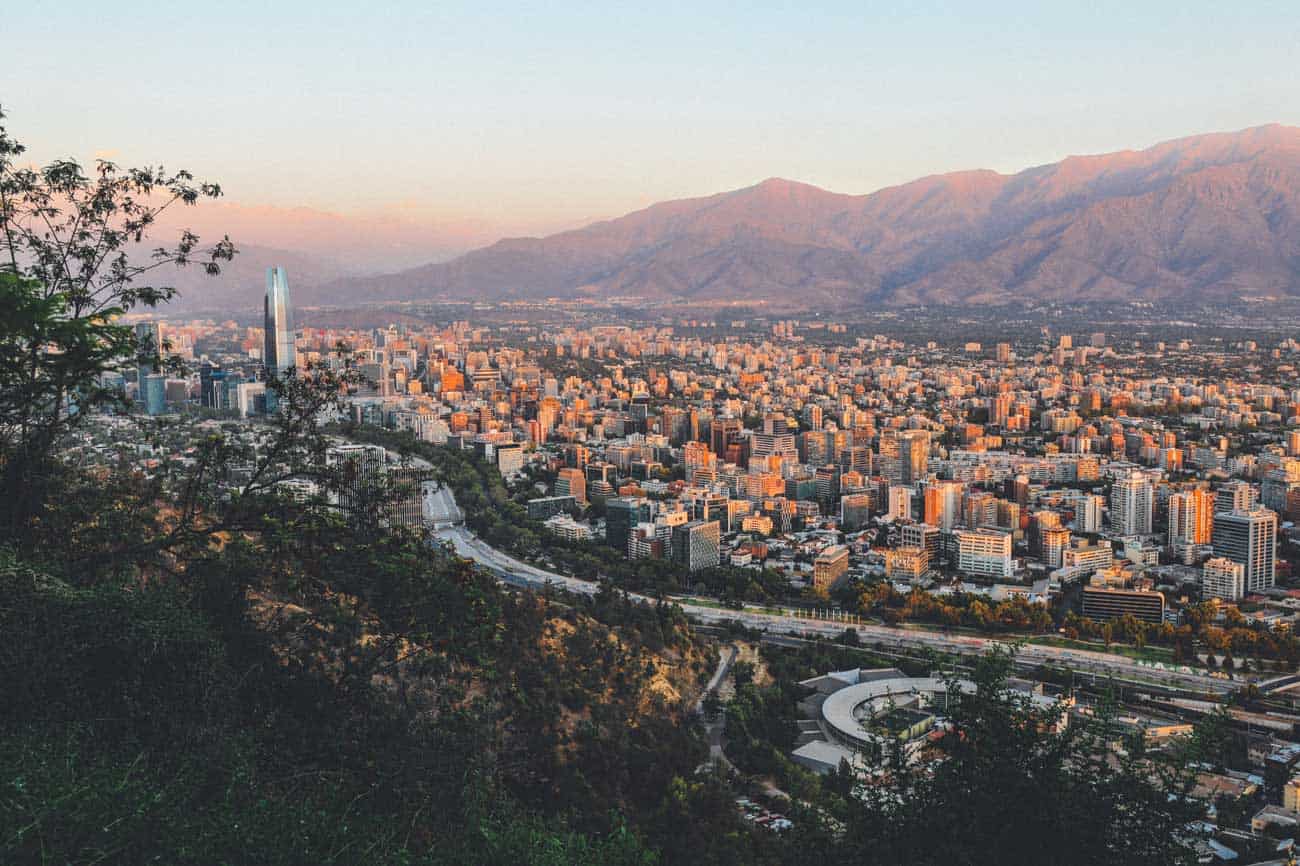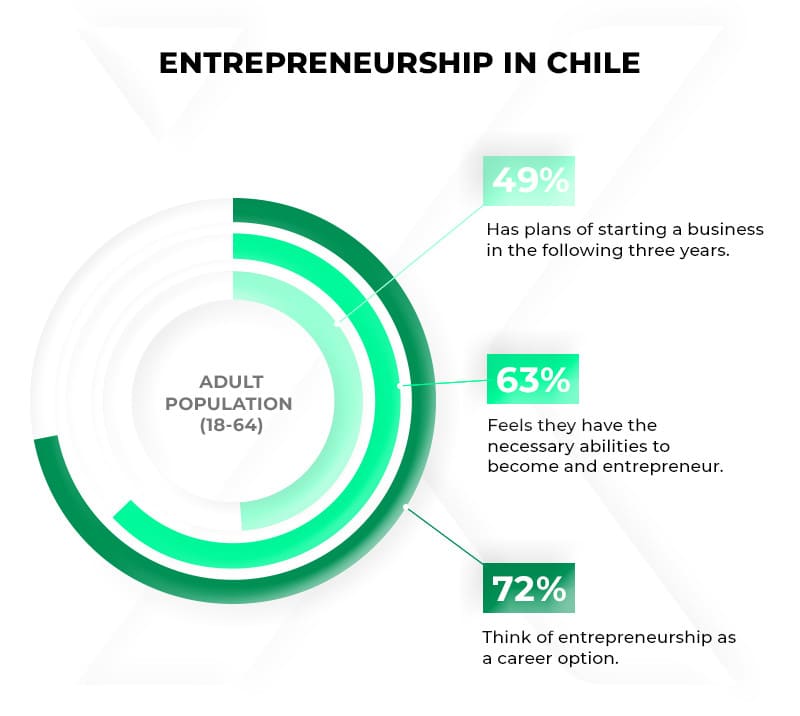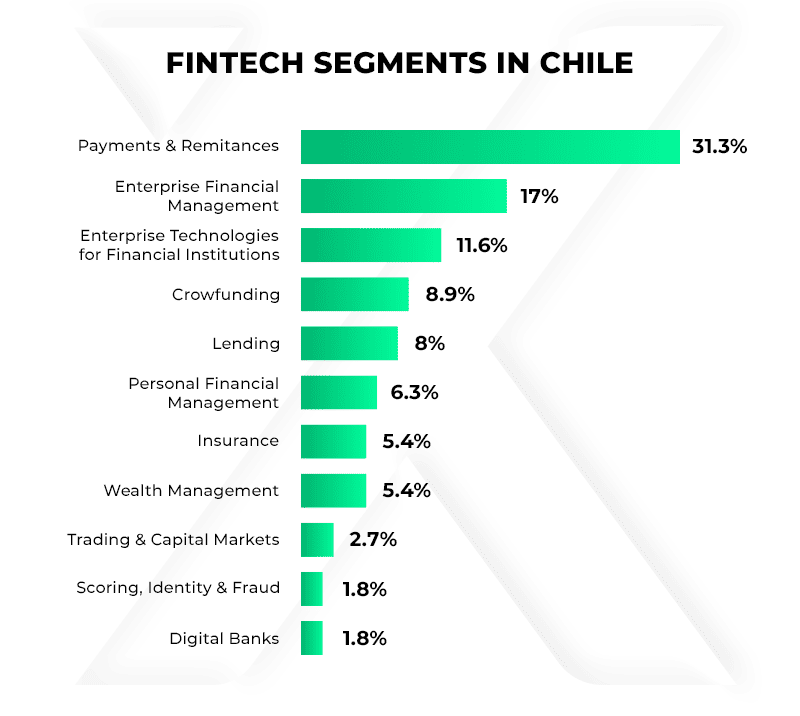
Por Carolina Zepeda
November 23, 2019
Contxto – Most innovative country, most sophisticated banking industry, a leader in technological development. They do say some nice things about Chile. In the startup world, this South American country with around 18 million citizens consistently impresses entrepreneurs and venture capitalists for reasons that quickly become apparent.
Regardless of its geographic isolation, it’s safe to assume that Chile is one of Latin America’s most active startup centers. With 72 percent of the population considering entrepreneurship as a viable career option, startup culture is an undeniable part of Chilean culture.
Here is a little bit about how “Chilecon Valley” became one of Latin America’s most innovative economies.
Something I find very interesting about Chile is how entrepreneurship seems inherent to the country. Almost as if it’s an everyday topic for citizens. Let’s not forget that Global Innovation Index sets Chile as the most innovative nation in Latin America.
According to the Global Entrepreneurship Monitor (GEM), 62 percent of adult Chileans (between the ages of 18 and 64 years old) consider there to be plausible entrepreneurship opportunities within the next six months within their communities. This number is impressive, especially compared to Mexico’s 36.4 percent.
Another great thing is that 72 percent of adults consider entrepreneurship to be a promising career path. In fact, 49 percent of the population plans to start a business within the next three years.
Insecurity can be an issue for those trying to launch a business. Not for Chileans. That’s to say, 63 percent of the population feels that they have the required abilities to become an entrepreneur. Again, comparing this variable with Mexico’s 50.1 percent, Chile appears to be on the top of its game.
According to Pablo Tirado from El Mercurio newspaper, there are also over 1,000 startups in Chile vying for international investments. While Chile still doesn’t have a unicorn, don’t let that dissuade you. There are four “Centaur” companies worth more than US$100 million and 31 “Little Ponies” worth more than US$10 million.
If this doesn’t prove the entrepreneurial mindset of Chile, then I don’t know what will.

Over the years, Chile has also developed new programs to integrate women into the startup ecosystem. In accordance with GEM, 42 percent of women comprise the entrepreneurial activity in initial stages. Plus, women lead 44 percent of established businesses in Chile.
Creating awareness and encouraging women to start a career or boost their current one is something that organizations like Girls in Tech Chile is doing. Similarly, there are startup programs specifically meant for female entrepreneurs.
The S Factory would be a key example of this. The pre-accelerating program provided by Start-Up Chile supports women-led startups. During the event, participants receive startup training, equity-free funding, as well as four months to turn their ideas into a reality.
Since 72 percent of Chileans have internet access, the number of digital banking, payment, and remittance applications continues to skyrocket. Even better, the latest figure from December 2017 says around 75 fintech startups operate in this Andean country. And who could forget, that genius concept known as “Chilecon Valley”, thanks to those expanding technological companies.
Fintech Radar, a survey conducted by Finnovista, shows that payment and remittances are the leading segments among Chilean fintechs with 31.1 percent. The financial management segment accounts for 17 percent and, enterprise technologies for financial institutions takes 11.6 percent.

The city of Santiago is also the center for all of this fintech innovation. 92 percent of startups come from the capital. And, luckily for most, they’re growing so much that internationalization is a tangible reality.
“Chilean fintechs are turning to Mexico, Colombia, Peru, and Argentina as their main destinations to offer their solutions beyond their country of origin,” said Fintech Radar.
Affluent fintech enterprises include Blink (with its financial app featuring invoice management and cash flow tools) as well as Übank (another money-centric app giving users the means to measure savings during daily tasks).
I think we’ve all heard about Start-Up Chile. This government initiative strives to support and accelerate the startup ecosystem in the country. Thanks to it, Santiago has become one of the most important tech hubs in Latin America.
Chile’s Production Development Corporation (CORFO) created the accelerator to make entrepreneurship part of the Chilean culture and mindset. I think it’s impressive how a government initiative like this one can have such an impact in the country and worldwide.
Founded in 2010, Start-Up Chile has accelerated over 1,600 companies from 85 different countries. At the end of 2018, the program already had a portfolio valued at US$1.4 billion. Even better, global sales went up to US$700 million from the date that operations started.
Thanks to its success, many around the globe have replicated the program. Public accelerators such as Startup Mexico, MaGIC from Malaysia, and IncuBAte from Argentina have modeled themselves after Start-Up Chile.
Imagine getting a full-fledged work visa in just 15 days—that’s a real possibility in Chile thanks to the former president, Michelle Bachelet. She started the “tech visa” program in 2016, allowing entrepreneurs, fresh talent, and investors to participate in the country’s rich startup ecosystem.
Specifically, this initiative aimed to aid Start-Up Chile and InvestChile participants to legally reside and work in the country. This strategic move tells the world that Chile is officially open for business.
In order to obtain a work visa, candidates must have a letter or certificate that proves the sponsorship from the respective program. Prior to the initiative, it took between 3 to 6 months for applicants to get proper working credentials. Extensions can easily be made, as well, once your short-term visa expires.
Hands down, Start-Up Chile is exceptional and has definitely helped to boost the startup ecosystem in Chile. All the while, you’d be wrong to assume that there aren’t any other successful programs and investors in the country.
According to Seedstars, Chile has more than 20 accelerators and incubators that support 450 startups each year. Additionally, more than 10 angel and family investors support the national ecosystem. Plus, seven VC investment funds and over 17 private funds all operate in Chile.
Some of these are Magma Partners, Chile Global Angeles, Fen Ventures, and Scale Capital.
These are just a few of the things that have earnt Chile with the nickname “Chilecon Valley.” One thing is for certain, and that is that we’ll be seeing more from Chile when it comes to innovation and entrepreneurship.
Besides having everything that’s needed to grow a startup into a Unicorn, none have come out of Chilecon Valley.
Mainly this is due to a lack of local risk investors in the country. According to Carolina Rossi mentor and jury at Start-Up Chile, “a high-potential entrepreneurship ecosystem is not complete without high-risk local investors. That is one of the biggest debts of 2019 in Chile.”
“Today many say they work in a venture capital fund, but when you ask them where they have invested, they respond that they have not found any projects.” Which proves the risk aversion of these investors in Chile’s ecosystem. After all, startups like Cornershop had to look elsewhere for investments.
Furthermore, unicorns are not only the result of a friendly startup ecosystem, “but also of the courage of those who put the A series or possible B series in the financing of startups,” as stated by Rossi.
Either way, a Unicorn could very well be flourishing. “There were no unicorns in Colombia until Rappi appeared,” said Andy Freire, managing partner for SoftBank Latin American Fund during and interview.
“Its no stretch of the imagination to imagine an upcoming unicorn brewing in Chile. In fact, I think it will happen sooner rather than later, and we would love to participate in any one who has the chance to get there.”
-CZ

Por Stiven Cartagena
January 12, 2026